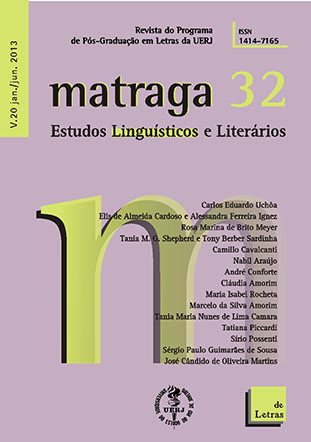ESTILO E AUTORIA EM RELATOS DE DOR
Palavras-chave:
ato de fala, autoria, estilo, identidade, relatos de dorResumo
Este trabalho busca verificar, por meio da análise de relatos sobre dor e sofrimento, em que medida os respectivos enunciadores encontram alívio e recursos internos para refazer suas vidas por meio do processo de narrar. As reflexões propostas são desdobramento de duas experiências correlatas: (i) a observação das falas de mães/pais pertencentes a um grupo de apoio a pais enlutados; falas tais que promoveram um desenvolvimento favorável do luto; e (ii) o fato de esta pesquisadora ter tido a oportunidade de ser a coautora de uma história incomum: a de um transexual que decidiu realizar a cirurgia para mudança de sexo e resolveu escrever sobre sua experiência de modo a transformar sua dor em narrativa. Em ambos os casos, observaram-se efeitos curativos e empoderamento identitário decorrentes da narrativização da dor. As peculiaridades dessas construções textuais cooperam para problematizar as noções de autoria e estilo, cujas definições oscilam entre um modo convencional de entendimento das noções (relacionado a uma concepção autonomista do sujeito da linguagem) e um modo discursivo (relacionado a uma concepção sócio-histórica desse sujeito). Utilizamo-nos de reflexões propostas por Possenti (1988, 2009, 2012), que mobiliza a noção de autor a partir de Foucault (1969) e problematiza a noção de estilo. A perpesctiva que permeia toda a reflexão é a pragmática, que entende a linguagem como performativa (AUSTIN: 1975) e lugar por excelência da construção identitária (RAJAGOPALAN: 2003, 2006). Do ponto de vista da construção narrativa, este artigo leva em conta, sobretudo, as reflexões de Paul Ricoeur (2010).
Downloads
Downloads
Publicado
Como Citar
Edição
Seção
Licença
AUTORIZAÇÃO
A Matraga – Revista do Programa de Pós-Graduação em Letras da UERJ está autorizada a publicar o artigo ora submetido, caso seja aceito para publicação online. Fica atestado que a contribuição é original, que não está sendo submetida a outro editor para publicação, e que a presente declaração é a expressão da verdade.
Os trabalhos publicados no espaço virtual da Matraga – Revista do Programa de Pós-Graduação em Letras da UERJ serão automaticamente cedidos, ficando os seus direitos autorais reservados à Matraga. Sua reprodução, total ou parcial, é condicionada à citação dos autores e dos dados da publicação.

A Matraga utiliza uma Licença Creative Commons - Atribuição-NãoComercial 4.0 Internacional.





